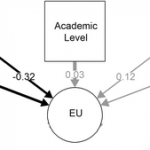Welcome to Epiphenom at its new home on Patheos! This blog has been running for seven years now, and over that time we’ve taken a look at a huge amount of cutting edge research into the psychology and sociology of religion and non-belief.
If you’re new to this blog, maybe you want to get a quick feel for what you’ve missed. Maybe any old-hands reading this will like a refresher too? Heck, even I found a bunch of stuff I’d half-forgotten!
blog, maybe you want to get a quick feel for what you’ve missed. Maybe any old-hands reading this will like a refresher too? Heck, even I found a bunch of stuff I’d half-forgotten!
So here are a few of my favourites from the 620-odd posts to date, chosen to give a good feel for what this blog is all about. Enjoy!
To kick us off, think about why some people are religious and others are not. Is religion or atheism the natural state for us humans?
There are, in fact, some studies that suggest that children naturally believe in omniscient beings – but frankly the evidence on whether kids have to be taught about the supernatural is ambiguous. And it seems that supernatural explanations just don’t occur to kids. They are fairly grounded in reality.
Is religion genetically determined? Well, religion is a complicated thing, so any genetic determinism is likely to be limited to particular aspects. There is, for example, evidence that fundamentalism is genetically determined. But the reality is that genes interact with environment in complex to influence how we respond to religion.
Hardship and uncertainty encourage religious beliefs
So what environmental factors could switch people in or out of religion? Well, as it happens that was the subject of some research I published back in 2009, and which was the motivation for this blog.
What I found was that less religious countries were more urban, more plural, and wealthier. All factors that had been found before. But I also found that they also had less income inequality, a result that has subsequently been confirmed.
In fact, less religious countries in general have higher quality of life than more religious countries. Education levels, too, are important.
Why? Well there is quite a lot of evidence that anxiety and insecurity have deep-seated psychological effects. If you remind people of death, or put them in anxiety-inducing situations, they become more superstitious, cling to deep-rooted cultural beliefs, and ramp up their belief in controlling gods.
On the other hand, religious people are often less worried about making mistakes or what may happen in the future. And the religious and non-religious differ in other ways too. Weirdly, a dose of religion can even numb pain.
How do the religious differ from non-believers?
Christians tend to be more concerned about purity and also feature strongly in a moral sense sometimes called ‘supersense’. Religious people also tend to be agreeable and conscientious, whereas atheists tend to be the opposite.
In fact, there is good evidence that atheists are more likely to be less empathic. Perhaps this is why, compared with the religious, they prefer video games to board games?
On the other hand a wealth of evidence shows that atheists tend to be more intelligent that the non-religious, an effect that seems to be primarily driven by the the very intelligent and the very dim. Probably it is not intelligence, per se, that drives this effective, but the ability to think deep.
Incidentally, it seems that some atheists have a nagging sense that god exists. They get sweaty when daring god. And non-religious Americans die younger.
Perhaps education helps explain why some countries are less religious than others. Incidentally, intelligence and religious belief seem to interact in fascinating ways with fertility.
So what about honesty?
Well, it’s been argued that world religions, with their focus on a ‘policeman in the sky’ monitoring behaviour, helped large-scale societies to develop.
Would a religious person be honest if their god didn’t care about right and wrong? The evidence is unclear. But it seems that it’s only punitive gods that deter cheating – compassionate gods encourage them.
Which is interesting, because people create god in their own image. Your god tends to have a more extreme version of your own political views. In fact, a person’s god tends to share their own beliefs and preferences.
Atheists are not trusted. In fact, they are about on a par with rapists when it comes to how much people trust them. Which is odd when you learn that religious countries are also the most corrupt. In fact, there is evidence that atheism actually increases levels of trust.
Maybe religion actually promotes distrust, and religious individuals seem to be content to delegate the hard work of punishment to their god. What’s more, the moral effects of religion seem only to be in effect in religious contexts – Christians are more moral on Sundays, for example.
What about belief in Hell? It seems that countries where belief in hell is widespread are also more fearful. And people who believe in hell tend to be less happy. No wonder belief in hell is less popular than it used to be!
Religion and authoritarianism
One last thought to end this post on, and that’s the intimate connection between religion and authoritarianism. It seems that simply being near a church can make people more hostile towards outsiders. That’s because fundamentalist beliefs seem to lead down a pathway towards right-wing authoritarianism (and so on to racism).
But atheists should not get too smug. They may not be genuine Nazis, but atheists are grammar Nazis!
Find more at the yearly round-ups
I hope you enjoyed that whirlwind tour. There’s tonnes more in the archives. So please do browse around and leave some comments. And if you want more, check out the annual reviews I post: 2013, 2012, 2011, 2010, and 2009.
 This article by Tom Rees was first published on Epiphenom. It is licensed under Creative Commons.
This article by Tom Rees was first published on Epiphenom. It is licensed under Creative Commons.














